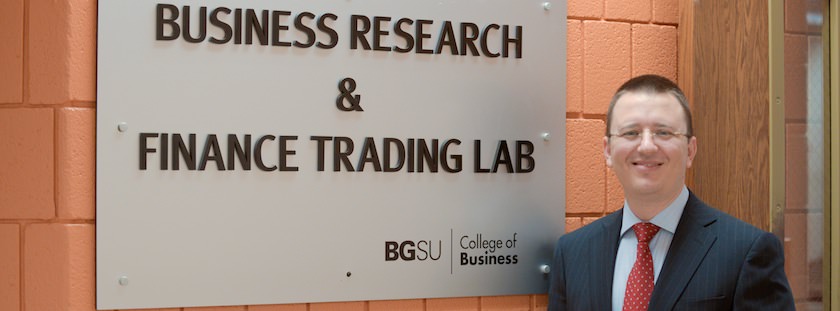Stock Market Volatility Inspires Research

Assistant finance professor, Dr. Stephen Rush, who joined the College this fall, is conducting research that impacts the finance field because it helps us to better understand how to prevent “flash crashes” in the stock market as well as assists us to understand algorithmic trading, known as automated trading or black-box trading. Dr. Rush’s current research is focused on informed vs. uninformed traders and how these traders affect the price of stocks.
Dr. Rush’s current research is in the area of finance called market microstructure which deals with frictions in markets (all of the expenses associated with a transaction). “My current project,” states Dr. Rush, “investigates whether a difference in information between a buyer and a seller will affect the price at which the two agree to trade. Information asymmetry is not unusual in markets and it affects swings in the market. In high frequency trading, it is becoming increasingly difficult to identify whether the extent of information asymmetry is enough to change trading behavior.”
“Market makers facilitate trades for investors and other traders with longer time horizons,” adds the finance professor. “They hold an inventory of stocks and earn money from the spread between the ‘bid’ and ‘ask’ prices rather than the return from companies generating value.”
According to Dr. Rush, “If an investor who has more information than the market maker thinks the price will go up, the investor will buy from the market maker and the market maker will sell stock as the price of the stock increases.”
The finance professor notes that a market maker would prefer to trade with the least informed investor where the price of the stock is unlikely to change.
Dr. Rush continues, “If a market maker knows he will trade with an informed investor, he should demand a premium to compensate for the loss that the market maker expects from selling as the price increases. This current study finds that there are opportunities to use the premium from adverse selection to generate risk-adjusted returns of over 17% per year regardless of market direction.”
This research which he is submitting for publication hopes to show how long-term investors can benefit from the frictions associated with high frequency trading.
Other research Dr. Rush is pursuing involves time, not in terms of what we think about a clock ticking, but where time is driven by information. According to Dr. Rush, “the next tick of the clock is when information is embedded in the market.”
Dr. Rush is a Chartered Financial Analyst and earned his Ph.D. in finance from the University of Connecticut. He holds an MBA and a master’s in finance from Boston College.
Before his academic position, Dr. Rush served as a sergeant in the U.S. Marine Corps where he served in various roles including Intelligence Chief, providing enemy strength, location, and action strategies to his commanding officer. After the Marine Corps, he worked as an equity analyst conducting fundamental analysis and executing trades by combining trading algorithms.
Contact Dr. Rush at srrush@bgsu.edu to learn more about his stock trading research.
Updated: 12/01/2017 10:59PM
